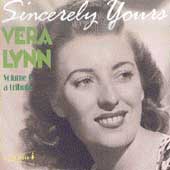Lynn was born Vera Margaret Welch on 20 March 1917 in East Ham, London. Later she adopted her grandmother's maiden name Lynn as her stage name.
She began singing at the age of seven in a working men's club. Her first radio broadcast, with the Joe Loss Orchestra, was in 1935. At this point she was being featured on records released by dance bands including Loss's and Charlie Kunz's.
In 1936 she made her first solo record, on the Crown label, "Up the Wooden Hill to Bedfordshire". This label was soon swallowed up by Decca. After a short stint with Loss she stayed with Kunz for a few years during which she recorded several standards. She later moved to the aristocrat of British dance bands, Bert Ambrose.
Lynn married clarinetist and saxophonist Harry Lewis in 1939, the year World War II broke out. In 1940 she began her own radio series, "Sincerely Yours", sending messages to British troops stationed abroad. In this show she and a quartet performed the songs most requested of her by soldiers abroad. She also went into hospitals to interview new mothers and send messages to their husbands overseas. She toured Egypt, India, Burma and gave outdoor concerts for soldiers.
In 1942 she recorded the Ross Parker/Hughie Charles song "We'll Meet Again" whilst making the film of the same name. The nostalgic lyrics ("We'll meet again, don't know where, don't know when, but I know we'll meet again some sunny day") had a great appeal to the many people separated from loved ones during the war, and it became one of the emblematic songs of the wartime period.
Contrary to later reports, she neither sang nor recorded the song Rose of England during this time and it was only in 1966 when her producer, David Gooch, selected it for her album 'More Hits of the Blitz' that she became familiar with it. The album itself was a follow up to 'Hits of the Blitz' produced by Norman Newell.
After the war, her "Auf Wiedersehn Sweetheart" became the first record by a British artist to top the US charts, doing so for nine weeks, and she appeared regularly on Tallulah Bankhead's US radio programme "The Big Show". "Auf Wiedersehn Sweetheart", along with "The Homing Waltz" and "Forget-Me-Not" gave Lynn a remarkable three entries on the first UK Singles Chart, a top 12 (which contained 15 songs owing to tied positions).
Lynn's career flourished in the 1950s, peaking with "My Son, My Son", a number-one hit in 1954. Lynn (who had one daughter) co-wrote the song with Eddie Calvert. In early 1960, Lynn left Decca Records, with whom she had been for nearly 25 years, and joined EMI. There, she recorded for EMI's Columbia, MGM and HMV labels.
Lynn was appointed an OBE (Officer of the Order of the British Empire) in 1969 and a DBE (Dame Commander of the Order of the British Empire) in 1975. In 1976 a charity dedicated to funding breast cancer research was founded, Lynn being its chair and later its president.
She sang outside Buckingham Palace in 1995 in a ceremony marking the golden jubilee of VE Day. Lynn, then 78, decided to go out on a high as this is her last known public performance.
However, while in Hawaii around 1988, she was spotted in the Tahitian Lanai having dinner. She was asked if she would sing a song. Never wanting to displease an audience, she sang a medley of her hits for around 30 minutes.
In 2002, at the age of 85 she became the president of the cerebral palsy charity SOS and hosted a celebrity concert on its behalf at Queen Elizabeth Hall in London.
The United Kingdom's VE Day Diamond Jubilee Ceremonies in 2005 included a concert in Trafalgar Square in which Vera Lynn made a surprise appearance. She made a speech praising the veterans and calling upon the younger generation always to remember their sacrifice and joined in with a bar or two of We'll Meet Again. Following that year's Royal British Legion Festival of Remembrance Dame Vera encouraged the Welsh mezzo-soprano singer Katherine Jenkins to assume the mantle of "Forces Sweetheart".
In her speech she said, "These boys gave their lives and some came home badly injured and for some families, life would never be the same. We should always remember, we should never forget and we should teach the children to remember."
